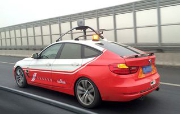
Google may be leading the way in developing its own self-driving car, but more and more tech firms are joining the race to make autonomous vehicles mainstream. Now Samsung has said it is setting up a team to develop a car components business focusing on autonomous driving technology and entertainment systems. And fellow Asian firm, Baidu, has revealed ambitious plans to build autonomous buses that could replace older forms of public transport.
Like Google, the company desires to use its mapping data in autonomous vehicles. Senior Vice President Wang Jing, told The Wall Street Journal that the firm is developing self-driving vehicles that will act as public buses. China’s state news agency, Xinhua has reported that search engine Baidu has already made a self-driving car which, in tests, hit speeds of 62 mph (100km/h).
The modified BMW 3 Series Gran Turismo was tested on expressways north of Beijing and use laser radars(激光雷达), sensors(传感器), and cameras alongside bespoke deep-leaning and mapping software. While the firm has not revealed plans to bring the cars to market, the first autonomous public transport could be on the roads in just three years. Baidu said it is in discussions with Chinese and foreign auto makers. Future vehicles will be designed to operate on fixed routes or within specific areas, making them more suited to public transport with set routes, rather than impulsive consumer drivers.
Mr Wang said: “We will cooperate with some governments to provide shared vehicles like a shuttle service; it could be a car or van, but for public use.”
Chinese bus maker Zhengzhou Yutong Bus Co is already said to have tested a prototype self-driving bus on a 20 mile (33km) drive through central China and claims it has successfully changed lanes, passed other vehicles and responded to traffic lights.
本时文内容由奇速英语国际教育研究院原创编写,禁止复制和任何商业用途,版权所有,侵权必究!
1.Baidu has revealed its plans to develop ______ that could be on roads in three years.
A laser radars
B self-driving cars
C autonomous buses
D car
解析:选C。细节理解题。根据文章第一段…Baidu, has revealed ambitious plans to build autonomous buses that could replace older forms of public transport可知,百度计划制造无人驾驶公交车,用以取代传统的公交车。根据文章第三段the first autonomous public transport could be on the roads in just three years可知,第一款自动驾驶的公交车将于三年之后投入运营。
2.What can we infer from the passage?
A Baidu has already mastered self-driving technology.
B Autonomous cars will be fashionable in the future.
C Smart phones have connections with self-driving cars.
D Google has made the best self-driving cars so far.
解析:选A。推理判断题。根据文章第二段Xinhua has reported that search engine Baidu has already made a self-driving car可知,百度已经制造了一款无人驾驶汽车,已经通过测试。由此判断,百度公司已经掌握了无人驾驶汽车的制造技术,为制造无人驾驶公交车提供了技术支持。
3.It is designed that future autonomous buses will ______.
A travel as impulsive consumer drivers do
B travel on fixed roads or in specific areas
C use sensors along with mapping software
D have the appearance of a car or van
解析:选A。推理判断题。根据文章第二段Xinhua has reported that search engine Baidu has already made a self-driving car可知,百度已经制造了一款无人驾驶汽车,已经通过测试。由此判断,百度公司已经掌握了无人驾驶汽车的制造技术,为制造无人驾驶公交车提供了技术支持。
4.Where can we most likely read this passage?
A From an E-mail
B From a science fiction
C In a technology report
D In a celebrity magazine
解析:选C。推理判断题。本文属于科普短文,介绍了百度将研发智能公交车的计划,因此读者能在科技报告中读到这篇文章。